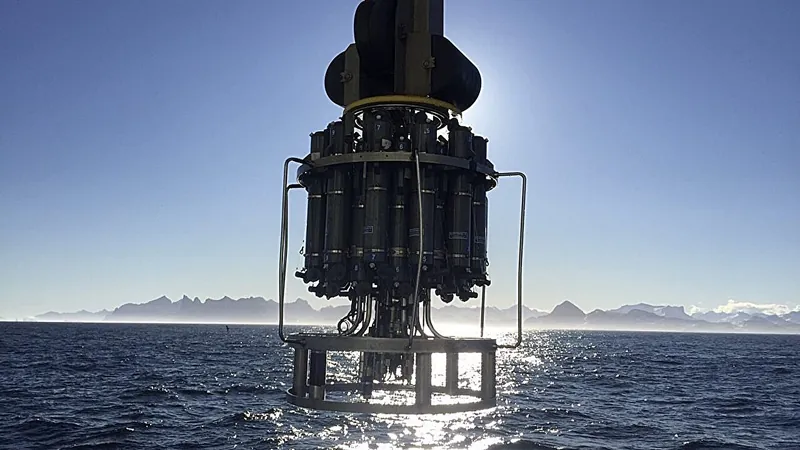
Shocking Stability: Atlantic Meridional Overturning Circulation Remains Steady Over the Past Six Decades!
2025-01-15
Author: Ting
Introduction
Recent research has revealed a startling finding that could reshape our understanding of the Atlantic Meridional Overturning Circulation (AMOC), a critical ocean current system that plays a vital role in regulating the Earth's climate. For those who might be unaware, AMOC is a massive conveyor belt of ocean currents in the Atlantic Ocean, intricately connected and driven by factors such as wind patterns and the varying densities of seawater. This system is essential for distributing heat, moisture, and nutrients across the globe and holds significant sway over weather patterns and climate stability.
Concerns Amid Climate Change
With climate change wreaking havoc across the planet, many scientists have been deeply concerned about the future of the AMOC. There’s a widespread fear that an influx of fresh water from melting polar ice could potentially disrupt this crucial current system, leading to disastrous environmental consequences. While many have warned of a potential collapse—an event that would have catastrophic effects on weather systems worldwide—new evidence suggests that the AMOC has held its ground over the past 60 years.
Breakthrough Study
According to a groundbreaking study conducted by a team from the Woods Hole Oceanographic Institution (WHOI) and published in *Nature Communications*, the AMOC has not weakened in the last six decades, challenging previous assumptions. "Our research indicates that the Atlantic overturning has not declined yet," noted Nicholas P. Foukal, a key contributor to the study. "This doesn't predict the future, but it does suggest that significant changes have not taken place."
Contradicting Earlier Reports
This finding directly contradicts earlier reports, particularly a paper from 2018 that claimed a noticeable decline in the AMOC over the past 70 years. The discrepancy arises partly from the reliance on sea surface temperature data to assess the AMOC's health—a method that recent findings show is less effective than previously believed. The WHOI research team utilized innovative data sets from the Coupled Model Intercomparison Project (CMIP), which offers enhanced climate simulations, providing a clearer picture of ocean dynamics.
Innovative Indicators
Digging deeper, the researchers shifted their focus to a different indicator: air-sea heat fluxes. This metric measures the exchange of heat between the ocean and atmosphere, and a robust AMOC is associated with higher heat transfer from the ocean, particularly over the North Atlantic. By analyzing decades of reanalysis data, which incorporate direct observational data into climate models, the authors constructed a more reliable understanding of the AMOC's stability.
Conclusion and Future Outlook
"Based on our results, it appears that the AMOC is more stable than we originally anticipated," stated Linus Vogt, a scientist involved in the research. This could imply that the AMOC is further from a tipping point than many scientists feared. Despite the general consensus that the AMOC is expected to slow down in the future, the likelihood of an imminent collapse seems increasingly remote based on this study.
However, this research isn't without its limitations. The authors caution that while their findings suggest stability, the datasets used have inherent uncertainties due to the scarcity of long-term, direct measurements of air-sea heat fluxes. Nevertheless, they conclude with some optimism: "A decline in AMOC over the last 60 years seems very unlikely," Terhaar affirmed.
As the world grapples with the realities of climate change, this new information from WHOI presents a crucial opportunity for further research and action. With evidence that the AMOC remains stable for now, scientists and policymakers may have a window to mitigate future changes before potential tipping points are reached. The fate of our climate could depend on the actions taken in the coming years—will we seize this chance?


 Brasil (PT)
Brasil (PT)
 Canada (EN)
Canada (EN)
 Chile (ES)
Chile (ES)
 Česko (CS)
Česko (CS)
 대한민국 (KO)
대한민국 (KO)
 España (ES)
España (ES)
 France (FR)
France (FR)
 Hong Kong (EN)
Hong Kong (EN)
 Italia (IT)
Italia (IT)
 日本 (JA)
日本 (JA)
 Magyarország (HU)
Magyarország (HU)
 Norge (NO)
Norge (NO)
 Polska (PL)
Polska (PL)
 Schweiz (DE)
Schweiz (DE)
 Singapore (EN)
Singapore (EN)
 Sverige (SV)
Sverige (SV)
 Suomi (FI)
Suomi (FI)
 Türkiye (TR)
Türkiye (TR)
 الإمارات العربية المتحدة (AR)
الإمارات العربية المتحدة (AR)